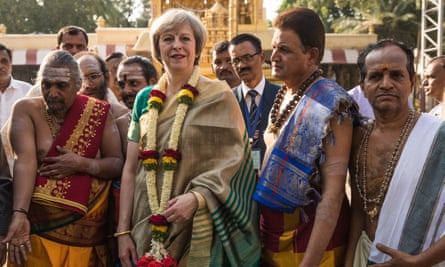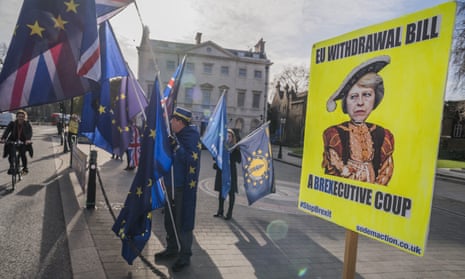The Vote Leave campaign promised that Britain would “take back control”, and that Brexit would give the UK back its sovereign powers.
If there is one thing we have learned from the progress of the EU withdrawal bill through parliament, it is that Theresa May is not interested in the sovereignty of parliament. Her government is hurtling headlong into a Brexit that could see the UK lose much control – over its borders, its trade with the world and its global standing.
Theresa May has set out her red lines: leaving the EU customs union, leaving the single market, and no longer being subject to EU laws or rulings of the European court of justice (ECJ). In other words, a hard Brexit. If the prime minister cannot deliver tough restrictions on immigration into the UK, she knows that Brexit will have failed, tangibly, to do what she promised.
Yet she is also unhappy with allowing parliament to scrutinise the government’s Brexit legislation because she knows this could threaten her wish for a hard Brexit at any cost.
Scheduling just one 12-hour debate on 12 June to tackle 15 amendments to the Brexit bill put forward by the House of Lords, the prime minister seeks to avoid the kind of parliamentary involvement that might just leave the credibility of her strategy in ruins.
May has chosen to sideline parliament before. In seeking to trigger article 50 without a vote in parliament, she attempted to exclude MPs and lords from the very start of the process.
The lords’ proposals are not wrecking amendments. They would give the House of Commons a say over the UK’s continued membership of the customs union, the EEA, the single market and all the EU agencies. They would prevent the government from using Henry VIII powers to amend primary legislation as it is transposed from EU legislation into UK law.
Other amendments would preserve the EU’s environmental protections in the UK, the principles of the EU Charter of Fundamental Rights and the EU’s rules on asylum-seekers, passing these into British law too. The lords also amended the EU withdrawal bill to give parliament a meaningful vote on the final deal – or no deal.

These are in the best interests of the country as a whole. And they help to maintain the delicate balance between the legislature and the executive, regardless of who is prime minister: Theresa May, Jeremy Corbyn or even Jacob Rees-Mogg.
So if May’s government is not interested in letting parliament consider the real alternatives, is it interested in “going global” or in increasing controls over the UK’s borders?
We are currently able to trade in a frictionless manner within the EU and freely with bilateral trade partners, which in total account for almost 70% of our trade. Business leaders are virtually unanimous that turning our back on all of this to trade as an EU third country is the wrong risk to take.
The Commonwealth Secretariat estimates that a free trade agreement (FTA) with India could boost bilateral trade by 26%, but the idea is too far-fetched for the UK’s inexperienced negotiators to consider. India has only nine FTAs – not one of them with a western country – and Indian politicians have already stated that free trade with the EU is their priority.
Free trade with other bilateral partners will also face huge obstacles. According to an Open Britain report this week, it takes, for example, an average of three years and nine months to agree terms with the United States, and five years nine months to negotiate a deal with China.
And, in the event of a no-deal Brexit, we will be forced to accept World Trade Organisation tariffs. Yet even this may not be the first problem that we face.
Under legislation related to rules of origin, the EU may be forced to block UK-manufactured components and parts altogether and find other sources. Innovative border technology will not save UK manufacturers from this catastrophic loss of production orders from the EU.
Negotiating freedom of trade requires us to make concessions on freedom of movement; and yet we cannot possibly have a fairer deal on both trade and immigration than we already have inside the EU.
Q&AWhat is a customs union?
Show
A customs union means that countries agree to apply no or very low tariffs to goods sold between them, and to collectively apply the same tariffs to imported goods from the rest of the world. International trade deals are then negotiated by the bloc as a whole.
For the EU, this means deals are negotiated by by Brussels, although individual member state governments agree the mandate and approve the final deal. The EU has trade deals covering 69 countries, including Canada and South Korea, which the UK has been attempting to roll over into post-Brexit bilateral agreements.
Proponents of an independent UK trade policy outside the EU customs union say Britain must forge its own deals if it is to take advantage of the world’s fastest-growing economies. However they have never explained why Germany manages to export more than three times the value in goods to China than Britain does, while also being in the EU customs union.
We have access to a market of 500 million people, while also being able to control who comes in and out of our country. EU legislation dating from 2004 even permits us to repatriate EU citizens who still lack a job or the means to support themselves three months after arriving in Britain.
The House of Lords chose to challenge the government’s hard-Brexit plan in a spirit of respect, and belief that MPs in the House of Commons would show leadership in the democratic process that the EU withdrawal bill requires.
If Theresa May believes in pushing through, with only minimal involvement of MPs, legislation for the most extreme form of Brexit, then she must take responsibility if her plan leads to catastrophe.
